Air exchanger installation Dartmouth is the key to solving indoor air quality problems that plague modern homes. Here's what you need to know:
Modern homes in Dartmouth are built to be energy-efficient. That means airtight construction with excellent insulation and weather stripping. But this creates a problem.
Without proper ventilation, your home traps humidity, cooking odors, dust, pet dander, and other pollutants. The air inside becomes stale and unhealthy. Research shows that indoor air can contain up to 100 times more pollutants compared to outdoor air.
Dartmouth's climate makes this worse. Hot, humid summers and cold winters mean you keep windows closed most of the year. Your home needs a mechanical ventilation system to maintain healthy indoor air quality.
An air exchanger solves this problem. It continuously removes stale, polluted air while bringing in fresh outdoor air. The system filters incoming air and uses heat recovery technology to maintain your home's temperature efficiently.
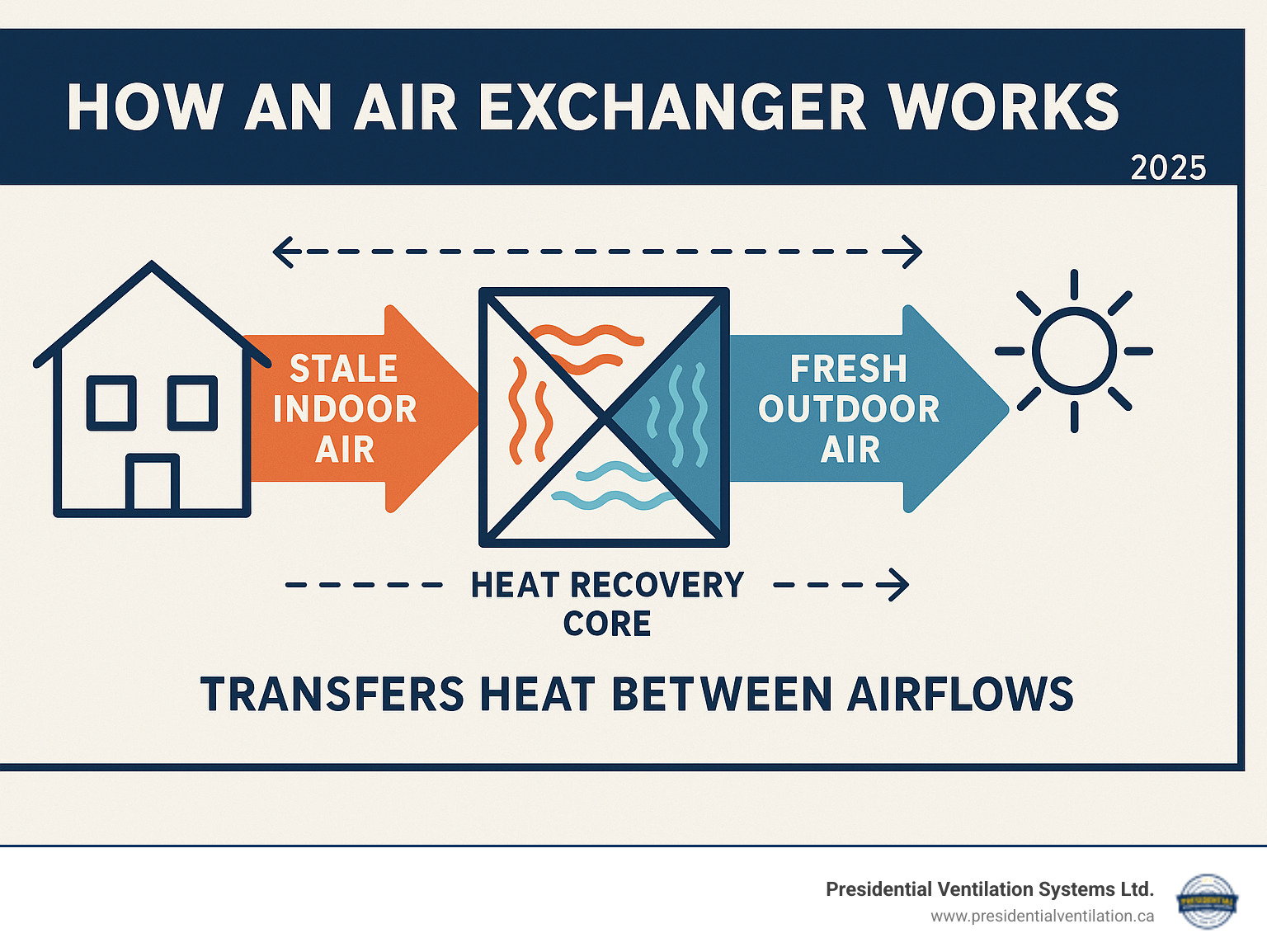
An air exchanger installation Dartmouth provides your home with fresh, clean air every day. While modern energy efficiency is great for heating bills, the tight seals trap cooking odors, dust, humidity, and pollutants inside.
Improved air quality is the primary benefit. An air exchanger works 24/7, replacing stale indoor air with fresh, filtered outdoor air. It's like having your windows open year-round, but without losing heat in winter or gaining humidity in summer.
For Dartmouth residents with allergies, an air exchanger provides significant allergy relief. The system's filters catch pollen, dust mites, and pet dander, helping many of our customers sleep better without congestion.
Mold prevention is crucial in Nova Scotia's climate. An air exchanger removes excess moisture from problem areas like bathrooms and kitchens before it can cause damage. Proper humidity control also makes your home more comfortable, eliminating stickiness in summer and static electricity in winter.
Odor removal is a natural result of constant fresh air circulation. Lingering cooking smells and pet odors are replaced with fresh air instead of settling into fabrics.
Your air exchanger also boosts energy efficiency. Its heat recovery technology captures warmth from outgoing air and transfers it to incoming fresh air. In winter, you get fresh air without losing heat. In summer, the system pre-cools incoming air, reducing the load on your furnace and air conditioner and lowering your energy bills.
The health benefits are substantial. Cleaner air leads to fewer respiratory irritations, better sleep, and more energy.
Your air exchanger tackles these common indoor pollutants:
Ready to breathe easier? Our comprehensive HVAC Services Dartmouth team can help you choose and install the perfect air exchanger for your home.
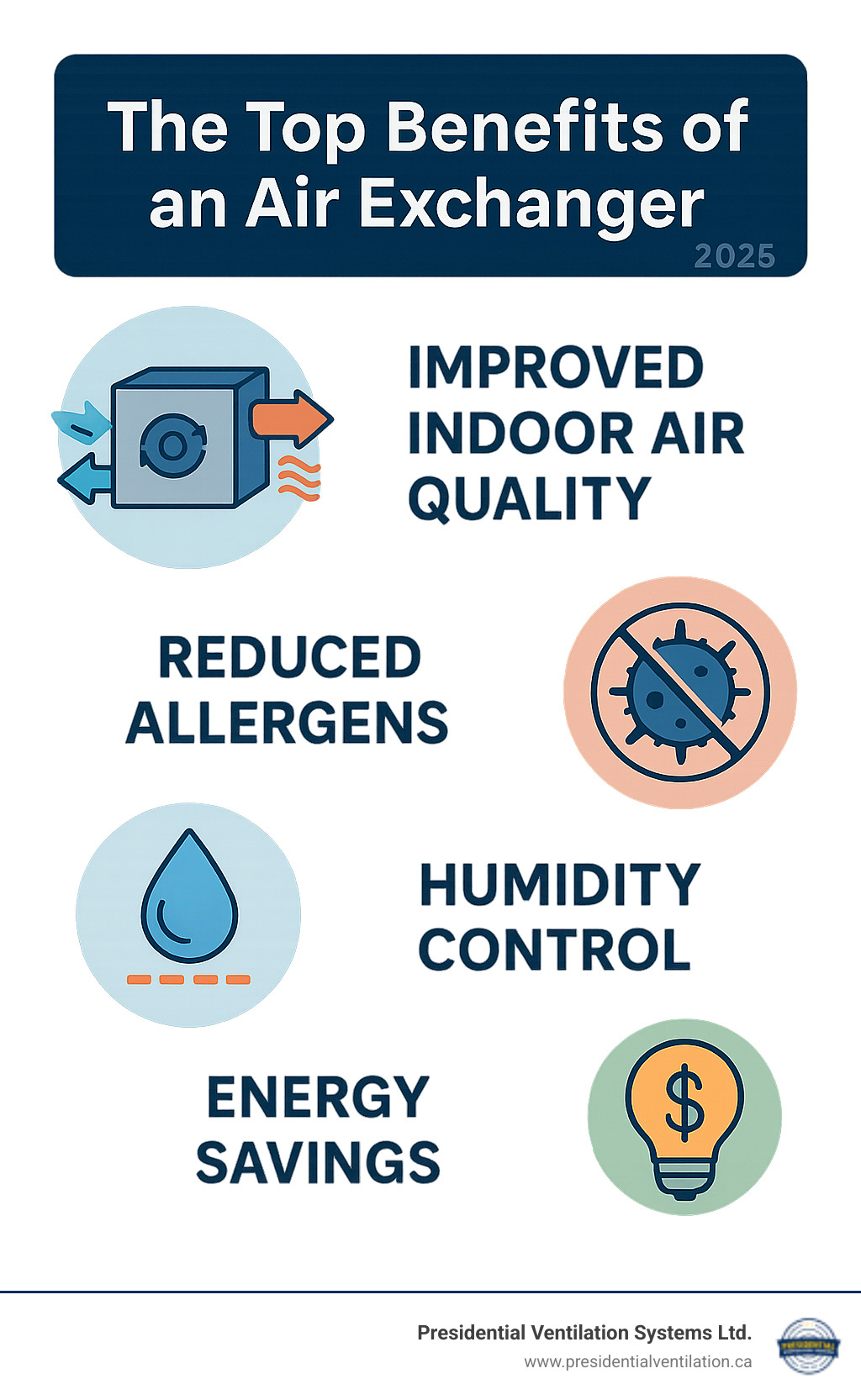
When considering an air exchanger installation Dartmouth, the main choice is between an HRV and an ERV. Both provide fresh, clean air but manage moisture differently, making them suitable for different conditions.
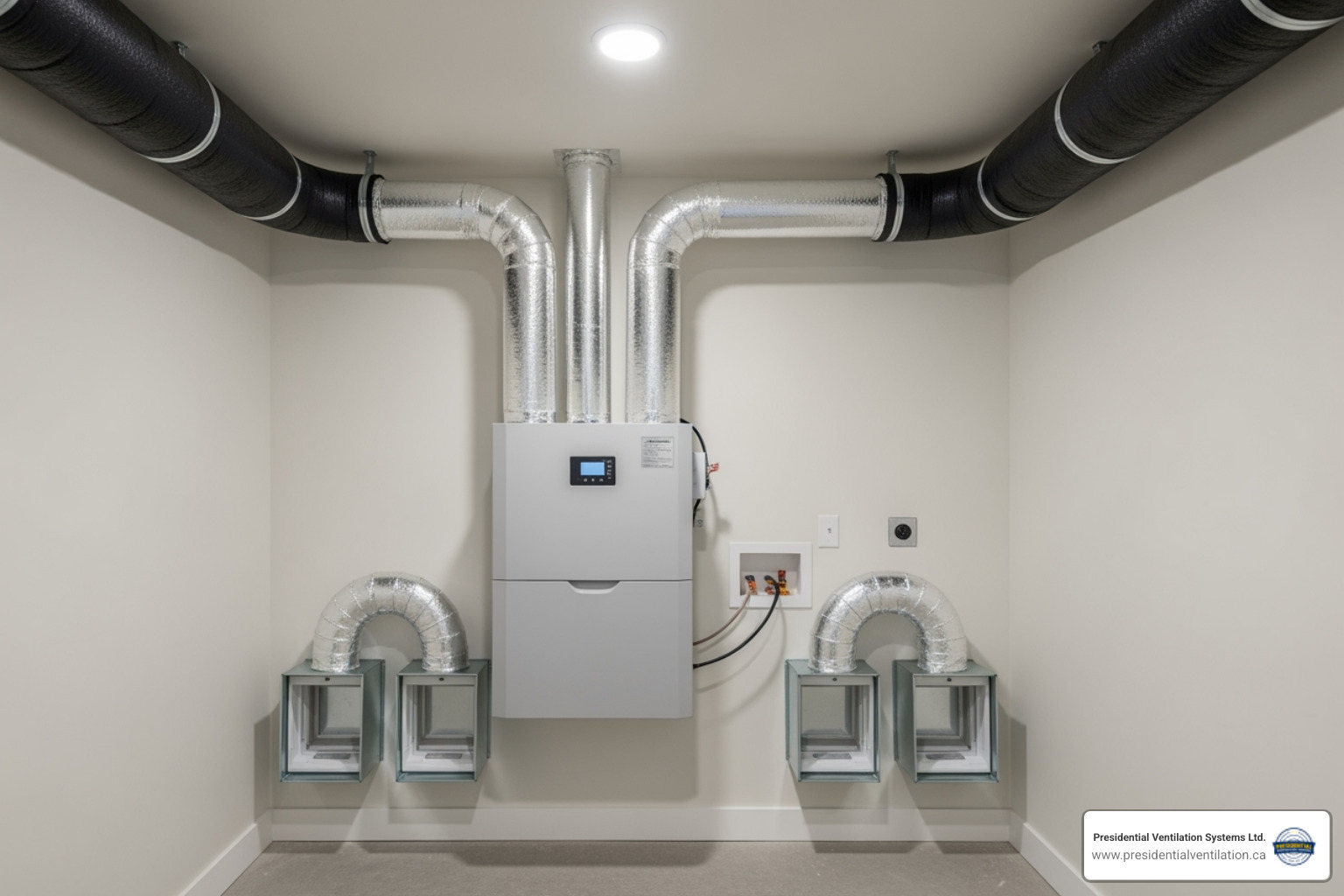
An HRV (Heat Recovery Ventilator) recovers heat from stale exhaust air to warm up incoming fresh air, saving on heating costs in winter. HRVs also excel at removing excess moisture, making them ideal for homes with high humidity and for colder climates.
An ERV (Energy Recovery Ventilator) does everything an HRV does, but it also transfers moisture. In summer, it removes humidity from incoming air, easing the load on your AC. In winter, it retains some humidity, preventing the indoor air from becoming too dry.
Here's how they compare side by side:
FeatureHRV (Heat Recovery Ventilator)ERV (Energy Recovery Ventilator)Heat TransferYes - recovers heat efficientlyYes - recovers heat efficientlyMoisture TransferMinimal - exhausts excess humidityYes - balances indoor humidityBest ClimateCold winters with humidity issuesClimates with both humid summers and dry wintersDartmouth WintersExcellent for heat recoveryExcellent for heat recovery plus humidity balanceDartmouth SummersGood for removing excess moistureSuperior for managing humid outdoor airEnergy SavingsHigh heat recovery efficiencyHigh heat and moisture recovery efficiency
For Dartmouth's climate, with its humid summers and cold winters, an ERV is often the best choice. However, an HRV may be better if your home has consistently high humidity year-round.
Our team assesses several factors to recommend the perfect system for your home:
A thorough assessment ensures your air exchanger installation Dartmouth project is custom to your specific needs.
The air exchanger installation Dartmouth process is straightforward with our experienced team. With over 30 years of experience, we ensure your installation is smooth and stress-free.
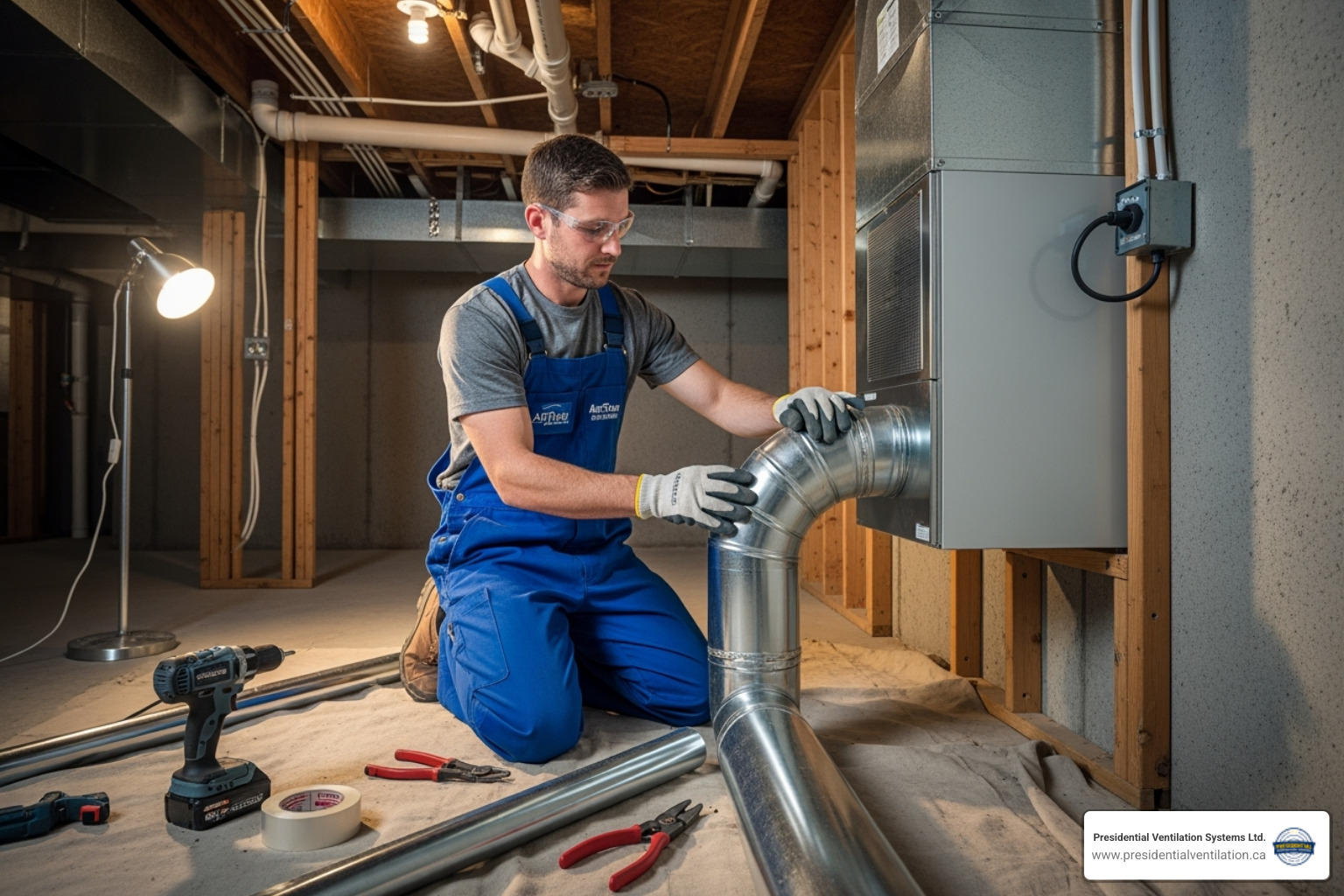
Our process includes:
Most air exchanger installation Dartmouth projects take just 1 to 2 days. The exact timeframe depends on whether it's a retrofit or new construction and the complexity of the system, such as the need for extensive new ductwork. We specialize in retrofits, minimizing disruption to your routine. We always communicate openly about the schedule and any unexpected factors.
Our commitment includes professional cleanup. We protect your home during installation and leave our work area tidy, so you can immediately enjoy your fresh, clean air.
Your new air exchanger installation Dartmouth requires some simple maintenance to perform at its best and keep your home's air fresh and healthy. A well-maintained unit will serve you for years, while a neglected one can lead to poor air quality and costly repairs.
Just like with our Heat Pump Maintenance Dartmouth services, regular upkeep prevents future headaches.
The investment for an air exchanger installation Dartmouth depends on your home's needs, but available rebates can significantly lower the cost.
Our team can help you steer these rebate programs to maximize your savings.
Here are answers to the most common questions we receive from Dartmouth homeowners about air exchangers.
Your system will usually provide clear warning signs when it needs attention. Look out for:
If you notice these signs, contact a professional. Like with Heat Pump Repair Dartmouth, early repairs are often simpler and less costly.
A quality air exchanger installation Dartmouth depends on the installer's qualifications. Ensure your technician has:
With over 30 years of experience, our qualifications are your assurance of a safe, efficient, and lasting installation.
Yes, air exchangers are designed for continuous, year-round operation to maintain healthy indoor air.
Running your air exchanger year-round ensures your family always breathes clean, fresh air while maintaining energy efficiency.
Your home should be the place where you feel safest and breathe easiest. After exploring everything from the basics of how air exchangers work to the nitty-gritty of installation and maintenance, one thing becomes crystal clear: air exchanger installation Dartmouth isn't just about upgrading your home's systems – it's about upgrading your family's quality of life.
Think about it. Every breath you take indoors affects your energy levels, sleep quality, and overall health. With improved air quality removing up to 100 times more pollutants than you'd find outdoors, allergy relief that actually works, humidity control that prevents mold growth, and energy savings that keep money in your pocket, an air exchanger transforms your home into the healthy sanctuary it should be.
Modern Dartmouth homes are built tight for energy efficiency, but that means they trap everything inside – the good and the bad. Without proper ventilation, you're essentially living in a sealed box with cooking odors, pet dander, excess moisture, and stale air. An air exchanger breaks that cycle, giving you continuous fresh air without throwing your energy bills out the window.
Professional installation makes all the difference. This isn't a weekend DIY project. It requires precise sizing, strategic ductwork placement, proper electrical connections, and careful system balancing. That's where our expertise shines.
At Presidential Ventilation Systems Ltd., we've been helping Nova Scotia families breathe better for over 30 years. Our certified Red Seal journeyman electricians and HVAC technicians bring decades of real-world experience to every project. As a trusted Daikin Comfort Pro Dealer, we don't just install equipment – we create complete comfort solutions custom to your home's unique needs.
Your family deserves clean, fresh air every single day. Don't let another season pass breathing stale, polluted indoor air. Take the first step towards a healthier home by exploring our expert Air Exchanger Installation Dartmouth services.
Ready to transform your home's air quality? Contact us today for a consultation. We'll assess your specific needs, explain your options clearly, and design a solution that fits your home and budget perfectly. Because when it comes to the air your family breathes, you deserve nothing less than exceptional.
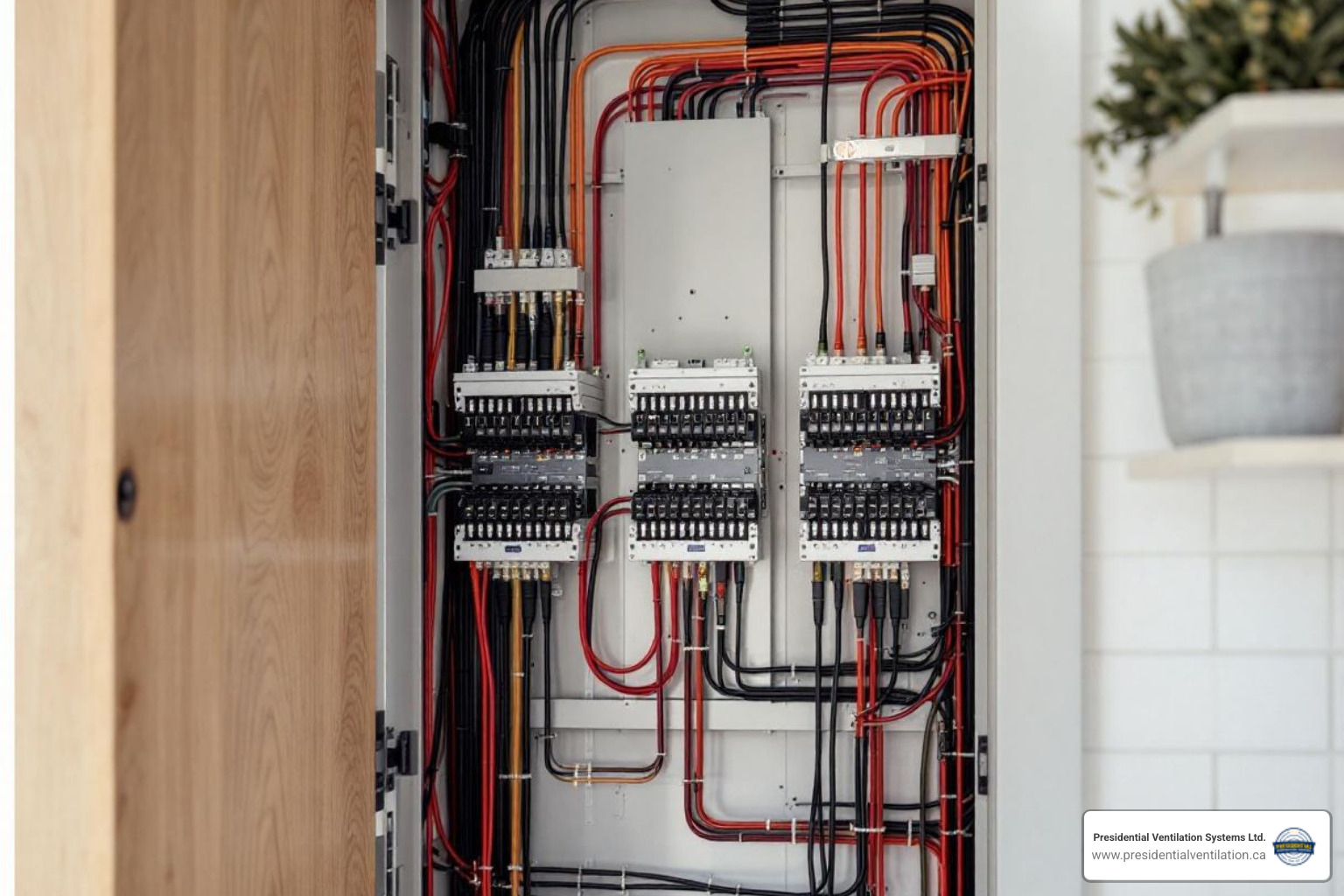


Finding the best electrical in mount uniacke, ns means connecting with licensed professionals who prioritize safety, code compliance, and quality workmanship in every project. Whether you're upgrading an outdated panel, wiring a new addition, or installing modern technology like EV chargers and heat pumps, the right electrician makes all the difference for your home's safety and functionality.
Many homes in Mount Uniacke built before 1990 face challenges with outdated electrical infrastructure. Aluminum wiring, undersized panels, and circuits that can't handle modern appliances create safety risks and limit your home's functionality. Professional electricians bring the expertise to upgrade these systems safely, ensuring your home meets current Canadian Electrical Code standards while supporting your family's power needs.
For comprehensive electrical solutions that prioritize your safety and comfort, explore our electrical services in Mount Uniacke, NS or contact us today for a free consultation.
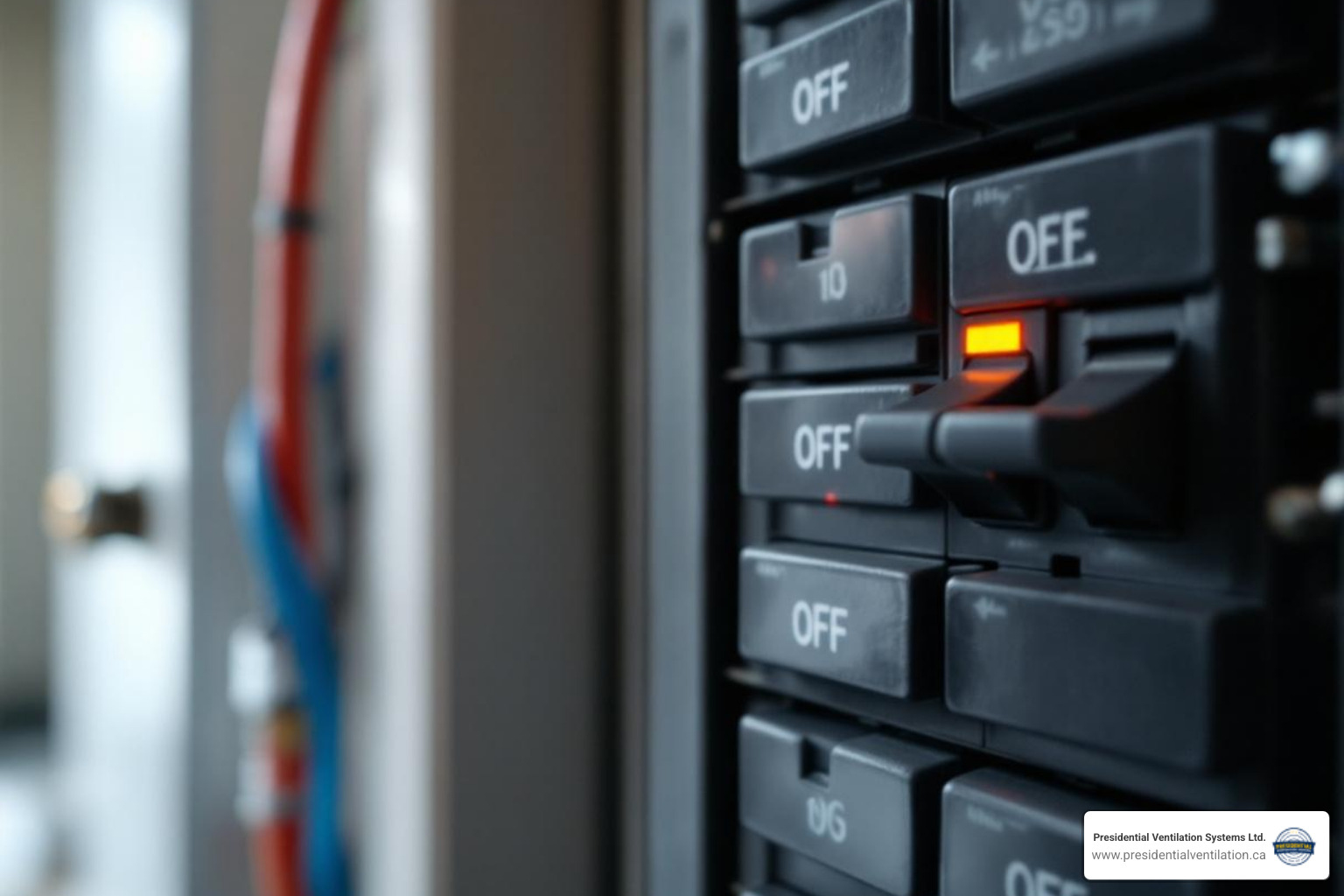
Choosing an electrician for your home or business in Mount Uniacke is a decision that impacts your safety, comfort, and peace of mind. We understand that you want reliable, expert service, and we believe these five factors are essential to consider.
When searching for the best electrical in mount uniacke, ns, the first thing to check is proper licensing and certification. We ensure our electricians are Red Seal-certified, which means they've met a national standard of excellence through rigorous training and examinations. This certification isn't just a badge; it signifies a deep understanding of the Canadian Electrical Code and provincial regulations, ensuring all work is safe and compliant. Choosing a certified professional means your electrical systems are installed, maintained, and repaired according to the highest safety standards, protecting your property and loved ones. For more on electrical safety, visit our page on Electrical Safety Services Canada.
Electrical work, while essential, carries inherent risks. That's why verifying your electrician has comprehensive liability insurance and Workers' Compensation Board (WCB) coverage is non-negotiable. Our insurance policies protect you from financial responsibility should any unforeseen accidents or damages occur during a project. WCB coverage ensures that if an electrician is injured on your property, their medical expenses and lost wages are covered, preventing you from being held liable. This dual protection offers you financial security and peace of mind, knowing that you're working with a responsible and prepared service provider.
Experience truly matters in the electrical field. We pride ourselves on having over 30 years of experience serving communities like Mount Uniacke, tackling everything from routine repairs to complex installations. A long-standing presence in the community often translates to a deep understanding of local electrical needs and building nuances. Beyond years in service, look at a company's reputation. Customer reviews and Better Business Bureau (BBB) ratings, such as an A+ rating, are excellent indicators of a company's commitment to quality and customer satisfaction. The BBB, for example, strives for an ethical marketplace where buyers and sellers trust each other. A strong reputation built on positive feedback and a solid project portfolio speaks volumes about the quality of work you can expect.
The needs of Mount Uniacke homes and businesses are diverse, ranging from simple light fixture installations to complex system overhauls. The best electrical in mount uniacke, ns will offer a comprehensive suite of services. This includes residential expertise for new home wiring, renovations, and panel upgrades, as well as commercial capabilities for businesses. We specialize in a wide range of services, including dedicated hookups for high-demand appliances, EV charger installations, and troubleshooting common electrical issues. Whether you need an electrician for your home or your commercial property, ensure they have the specific skills and experience required for your project. You can learn more about our Best Commercial Electrical Mount Uniacke NS offerings.
Finally, effective communication and professionalism are hallmarks of an excellent electrical service provider. From your initial inquiry to the completion of the project, you should expect transparent estimates, clear project timelines, and honest communication. Our team believes in keeping you informed every step of the way, answering all your questions, and respecting your home or business. We ensure our workspace is clean and safe, and our electricians are courteous and professional. This commitment to clear communication and high standards of professionalism ensures a seamless and stress-free experience, building trust for future electrical needs.
Mount Uniacke homes, like many in Nova Scotia, often require a variety of electrical services to ensure safety, efficiency, and comfort. From tackling home renovations to ensuring new constructions are up to code, and performing essential safety inspections, our team is equipped to handle it all. We also excel at troubleshooting those perplexing electrical issues that can disrupt your daily life. For commercial properties, we also offer comprehensive Commercial Electrical Repairs.
Our homes today demand more power than ever before. With an increasing number of appliances, smart devices, and entertainment systems, older electrical panels often struggle to keep up. If your home still uses fuses, your panel is over 25 years old, or you experience frequent breaker trips, it's a clear sign you need a panel upgrade.
A panel upgrade or electrical service upgrade increases your home's electrical capacity, allowing it to safely support modern appliances and technology. For example, a growing family might need to replace an outdated 100-amp panel with a modern 200-amp service to accommodate new kitchen appliances, a home office, or an EV charger. This upgrade not only prevents inconvenient power outages but also improves the overall safety and value of your property.
Many homes in Mount Uniacke built before 1990 may have outdated electrical infrastructure, such as aluminum wiring or cloth-insulated wires. These older wiring systems can pose significant safety risks, including fire hazards, and often struggle to handle modern electrical loads. Common signs of outdated wiring include flickering lights, frequently tripped breakers, buzzing sounds from outlets, or outlets that no longer work.
We specialize in aluminum wiring remediation and can replace old, unsafe wiring with new, code-compliant copper wiring. This process brings your home up to current Canadian Electrical Code standards, ensuring safety and reliability for years to come. For a deeper dive into modern wiring standards, check out our Electrical Wiring Guide 2025. Correcting these issues is crucial for the safety of your family and the longevity of your home's electrical system.
As technology advances, so do our electrical needs. The best electrical in mount uniacke, ns isn't just about repairs; it's about helping you integrate cutting-edge solutions for energy efficiency, home automation, and future-proofing your property. Whether you're looking to power high-demand equipment or improve your living space with smart technology, specialized electrical installations are key.
The shift towards greener living and modern conveniences means new demands on your electrical system. We provide expert installation for:
Beyond essential power, specialized electrical services can significantly improve your home's comfort, convenience, and aesthetic appeal:
We often hear similar questions from homeowners in Mount Uniacke, and we're always happy to provide clear, straightforward answers.
A Red Seal Certified Electrician is an electrician who has achieved a national standard of excellence in their trade. This certification is a testament to rigorous training, extensive practical experience, and a deep, up-to-date knowledge of the Canadian Electrical Code. It's important because it guarantees that the electrician working in your home or business possesses the highest level of professional qualifications. When you hire a Red Seal certified professional, you're ensuring that the work adheres to the strictest safety standards, is of the highest quality craftsmanship, and will stand the test of time. It's a commitment to safety and quality that we proudly uphold.
A proper electrical quote should be transparent and comprehensive, leaving no room for surprises. It should clearly detail the scope of work, outlining every task that will be performed. You should expect a breakdown of materials, including specific parts and quantities, as well as labor details, indicating the estimated hours and number of electricians involved. Crucially, the quote should also include information about any necessary permits, as we handle all permit applications and coordinate required inspections to ensure full compliance. While we don't discuss specific pricing, a detailed quote ensures you understand exactly what you're paying for.
There are several tell-tale signs that your home's electrical system might be outdated and in need of an upgrade or inspection. If you frequently experience tripped breakers, or if your home still uses old-fashioned fuses instead of modern circuit breakers, it's a strong indicator. Insufficient outlets for your modern devices, flickering or dimming lights when appliances turn on, or buzzing sounds coming from outlets or switches are also red flags. Additionally, if your outlets feel warm to the touch, or you notice any burning smells near electrical fixtures, these are serious warnings that require immediate professional attention. Many homes in Mount Uniacke built before 1990 may struggle with these issues, and addressing them is vital for your safety.
When it comes to your home's electrical system, compromise is not an option. We've explored the key factors for choosing an electrician, from verifying licensing and insurance to evaluating experience and ensuring clear communication. We've also highlighted the common and specialized services crucial for Mount Uniacke homes, emphasizing the importance of upgrading for modern demands and addressing outdated wiring.
At Presidential Ventilation Systems Ltd., we are committed to being your trusted partner for safe and reliable electrical solutions. Our Red Seal-certified electricians are dedicated to upholding the highest standards of code compliance and long-term safety, ensuring your peace of mind. We understand the unique needs of Mount Uniacke residents and are ready to electrify your expectations with expert and professional service.
For all your electrical needs, from essential upgrades to specialized installations, choose the best electrical in mount uniacke, ns. Contact us today to experience the Presidential Ventilation Systems Ltd. difference and learn more about our comprehensive electrical services in Mount Uniacke, NS.
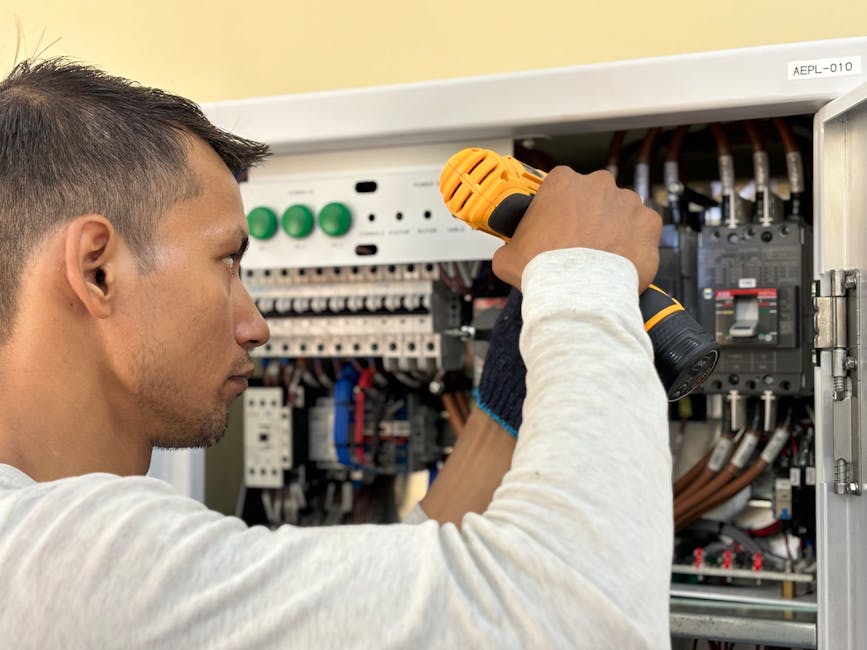


When you're looking for the best electrical in lower sackville, ns, you need contractors who understand the unique mix of older homes and new developments in this established community. From updating panels in 1970s bungalows to wiring new family homes, the right electrical partner makes all the difference.
Top Electrical Services in Lower Sackville:
Many Lower Sackville properties still operate with electrical systems designed for a different era. Modern appliances, home offices, electric vehicles, and advanced heating systems all demand more from your electrical infrastructure than ever before. Outdated wiring doesn't just struggle to keep up - it can lead to increased energy consumption, damaged electronics, and serious safety hazards.
For comprehensive electrical solutions throughout Halifax Regional Municipality, explore our electrical services in Halifax. Ready to upgrade your electrical system? Contact us for a professional assessment in Lower Sackville.
Whether you're dealing with frequent breaker trips, planning a renovation, or simply want to ensure your home's electrical system is safe and efficient, understanding your options helps you make informed decisions. Local electricians who know Sackville's building stock - from established neighborhoods around Sackville Drive to newer subdivisions - bring valuable expertise to every project.
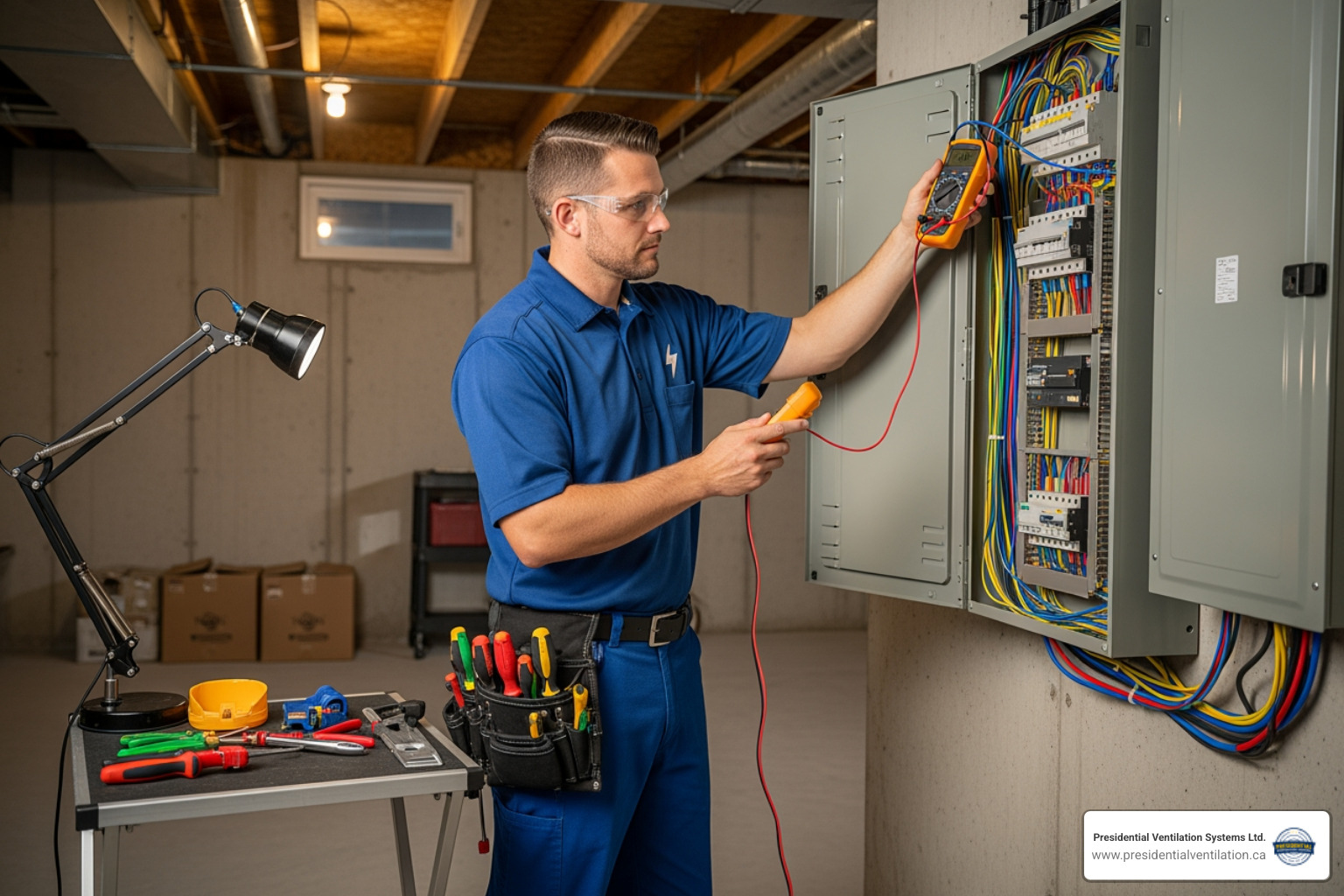
Lower Sackville, with its distinct community feel, presents a fascinating blend of residential and commercial electrical needs. From the charm of 1970s bungalows to the modern demands of newly constructed family homes and the busy local businesses, each property has its own electrical story. We recognize that understanding these specific property types in Sackville is crucial for providing the most effective and custom electrical solutions.
Many homes and businesses in Lower Sackville still operate with outdated electrical systems, which can struggle significantly to meet the power demands of contemporary living. Think about all the devices we rely on daily: high-definition televisions, powerful kitchen appliances, home office setups, and charging stations for our growing collection of gadgets. These modern conveniences put a strain on older electrical infrastructures that were never designed for such loads.
Unaddressed electrical issues stemming from these outdated systems are not just inconvenient; they can lead to a cascade of problems. You might notice increased energy consumption as your system works harder than it should, or damaged electronics due to inconsistent power. Most critically, outdated electrical systems pose serious fire hazards, putting your property and loved ones at risk. That is why ensuring your electrical system is up to code and capable of handling your current and future needs is paramount. For a deeper dive into local electrical considerations, consult our Electrical Lower Sackville NS Guide.
When residents and businesses in Lower Sackville seek the best electrical in lower sackville, ns, they often require a range of services designed to improve safety, efficiency, and comfort. From foundational system upgrades to specialized installations for modern technology, we offer comprehensive solutions. Our goal is to provide reliable power that supports every aspect of your daily life and business operations. Explore our full suite of Electrical Services Lower Sackville NS.
One of the most critical services we provide in Lower Sackville is panel upgrades and service improvements. Many older homes in the area were built with fuse boxes, a technology that was perfectly adequate for the electrical demands of their time. However, modern living has significantly increased our energy needs. Today’s homes are filled with appliances, electronics, and heating systems that require a much higher and more consistent power supply.
Panel upgrades involve removing these outdated fuse boxes and installing modern circuit breaker systems. These advanced systems are designed to support higher energy loads, offering greater safety and reliability. A common scenario we encounter is a homeowner with a 1970s bungalow looking to upgrade their electrical panel to 200 amps to meet current code and support new appliances. This not only brings the home up to modern standards but also prevents frequent breaker trips and potential overloads.
Panel replacements and most system upgrades require permits to ensure compliance with provincial codes. We carefully handle all permitting and inspection arrangements as part of our electrical services in Lower Sackville, NS, ensuring your upgrade is not only effective but also fully compliant and safe. This commitment to code compliance is a hallmark of the best electrical in lower sackville, ns. For more information on system improvements, refer to our Electrical Guide Lower Sackville NS.
Lighting plays a pivotal role in the ambiance, safety, and functionality of any home or business. In Lower Sackville, we offer a wide array of interior and exterior lighting installations designed to meet diverse needs and aesthetic preferences. Whether you're looking to brighten your kitchen with sleek under-cabinet lighting, add security with exterior floodlights, or create a cozy atmosphere with strategically placed pot lights, we have the expertise to bring your vision to life.
Beyond new installations, electrical renovations and rewiring are frequently requested, especially for older properties. Many homes in the region may still have outdated or even unsafe wiring, such as aluminum wiring, which was common in the past but can pose risks over time. We specialize in aluminum wiring upgrades, replacing it with safer copper alternatives to improve performance and meet modern electrical code standards. Full-home rewiring for a 1970s-era bungalow, for example, can dramatically improve safety and electrical capacity.
Our services extend to all aspects of electrical renovations, ensuring that any modifications to your home or business are executed with precision and adherence to the highest safety standards. From adding recessed lighting during a home renovation to upgrading commercial lighting for energy efficiency, we provide comprehensive and reliable solutions.
As technology evolves, so do our electrical needs. In Lower Sackville, we are increasingly helping residents and businesses adapt their properties to support cutting-edge technologies and conveniences. These specialized installations are key to ensuring your property remains functional, efficient, and ready for the future.
One of the most sought-after services today is the installation of Electric Vehicle (EV) chargers. As more people accept electric transportation, dedicated home charging stations are becoming a standard residential electrical need. We expertly install these units, ensuring they are safely integrated into your home's electrical system and meet all local codes.
Beyond EVs, modern comfort solutions like ductless heat pumps and electric in-floor heating are gaining popularity. Heat pumps offer efficient heating and cooling, while electric in-floor heating provides luxurious warmth, especially in bathrooms and basements. We handle all the electrical work required for these systems, from connecting new heat pump units to wiring electric in-floor heating mats. We even assist clients transitioning from oil heating to electric, which often involves service upgrades, electric water heater installations, and comprehensive wiring for heat pumps.
Smart home devices, such as programmable thermostats, automated lighting, and integrated security systems, are also changing how we interact with our homes. We provide the necessary electrical infrastructure and connections to ensure these smart devices function seamlessly.
Finally, for improved reliability and peace of mind, especially during Nova Scotia's unpredictable weather, generator panels are an excellent investment. Backup generator systems are important for maintaining power during outages, and we install the necessary transfer switches and wiring to ensure your home or business remains powered when the grid goes down. These specialized services are what truly set apart the best electrical in lower sackville, ns. For further details on modern electrical solutions, visit our Electrical Services Bedford NS page.
Investing in professional electrical upgrades for your Lower Sackville property offers far more than just convenience; it’s an investment in safety, efficiency, and future-proofing. When considering the best electrical in lower sackville, ns, understanding the profound benefits of these upgrades is essential. Our services are designed to bring long-term value to your home or business.
The primary benefit of professional electrical upgrades is significantly enhancing safety. Outdated electrical systems are a leading cause of residential fires, making the prevention of fire hazards a top priority. We identify and rectify potential risks such as frayed wiring, overloaded circuits, and faulty connections. Installing modern safety features like Ground Fault Circuit Interrupters (GFCIs) and Arc Fault Circuit Interrupters (AFCIs) in appropriate areas provides critical protection against electrical shocks and fires.
Beyond fire safety, protecting your valuable electronics is crucial. Unexpected voltage spikes, often caused by lightning or power grid fluctuations, can instantly fry sensitive appliances. Surge protection systems, particularly whole-home surge protection, safeguard all connected devices, offering peace of mind.
System efficiency is another major gain. Many homes and businesses in Lower Sackville operate with electrical systems that struggle to meet modern power demands, leading to increased energy consumption. Upgrading outdated wiring and panels ensures your system operates optimally, reducing energy waste. For commercial spaces, we offer energy-efficient improvements such as lighting retrofits and occupancy sensor installations, which can lead to a significant reduction in energy use. Regular electrical safety audits are also invaluable, especially when buying, selling, or renovating a property, as they identify potential problems before they become major repairs. Learn more about our safety and efficiency solutions on our Electrical Services Dartmouth NS page.
In today’s rapidly evolving world, future-proofing your electrical system is a smart strategic move for any Lower Sackville homeowner or business. Our electrical upgrades ensure your property can seamlessly integrate new appliances, accommodate home additions, and meet the demands of new construction electrical projects.
Modern appliances are increasingly power-hungry, and older electrical systems often lack the capacity to support them without tripping breakers or causing other issues. By upgrading your panel and wiring, you ensure your home is ready for that new induction stove, high-efficiency dryer, or advanced home entertainment system. Similarly, if you're planning home additions or extensive renovations, ensuring your electrical system can handle the increased load is critical. We provide full electrical installations for new construction projects, ensuring they are built to code specifications from the ground up.
Meeting modern electrical code standards is not just about compliance; it's about ensuring safety and functionality for decades to come. Nova Scotia electrical code standards are designed to keep properties safe and efficient, and our work prioritizes adherence to these regulations. By investing in comprehensive electrical solutions now, you avoid extensive retrofits and headaches down the road, ensuring your Lower Sackville property remains safe, functional, and valuable. For insights into preparing your property for the future, visit our Electrical Services Mount Uniacke NS page.
When searching for the best electrical in lower sackville, ns, you want to ensure you're entrusting your property to skilled, reliable, and trustworthy professionals. Choosing the right electrician is a crucial decision that impacts your safety, comfort, and the longevity of your electrical systems. We believe in empowering our clients with the knowledge to make informed choices.
Here's a list of questions to ask a potential electrician:
What truly distinguishes the best electrical in lower sackville, ns? It comes down to a combination of expertise, dedication to safety, and transparent customer service. Here are the key qualities we believe every top-tier electrical contractor should possess:
We are dedicated to powering homes and businesses with excellence, reliability, and innovation, ensuring that every project meets the highest standards. For more on what to look for in a quality electrician, visit our Electrical Services Truro NS page.
Operating an electrical system safely and legally in Lower Sackville, and indeed across Nova Scotia, hinges entirely on strict adherence to licensing and compliance requirements. This isn't just bureaucratic red tape; it's a fundamental safeguard for your property and everyone within it.
Nova Scotia electrical code standards are rigorous and constantly updated to reflect the latest in safety technology and practices. Any electrical work, from minor repairs to major installations, must meet these provincial codes. This ensures that the wiring, components, and overall system are installed correctly and safely, minimizing risks like electrical fires, shocks, and system failures.
A critical aspect of compliance is the necessity of permits for most electrical upgrades and panel replacements. For example, if you're undertaking a panel upgrade to replace an old fuse box or installing a new electrical service for an addition, a permit is required. This permit ensures that a qualified professional reviews the proposed work and that the completed installation is inspected by the appropriate authorities. We handle all permitting and inspection arrangements as part of our electrical services in Lower Sackville, NS, taking the guesswork and hassle out of the process for you.
Engaging licensed technicians is non-negotiable. Licensed electricians have undergone extensive training, passed rigorous exams, and are up-to-date with current codes and safety protocols. Their licensing also typically means they are insured, providing an additional layer of protection for you should any unforeseen issues arise. By insisting on licensed and qualified professionals, you ensure that your electrical work is not only compliant but also executed to the highest standards of safety and quality. This commitment to proper procedure is a cornerstone of the best electrical in lower sackville, ns. For further details on proper electrical practices, refer to our Electrical Services Beaver Bank NS page.
We understand that electrical systems can be complex, and you likely have questions about maintaining and upgrading your home's electrical infrastructure. Here are some of the most common questions we receive from residents in Lower Sackville.
For optimal safety and performance, we recommend a professional electrical inspection every 3–5 years, especially if you live in an older home in Lower Sackville. Older homes often have wiring and panels that may not be up to current code or sufficient for modern electrical demands.
However, if you notice any warning signs, don't wait for your scheduled inspection. Flickering lights, frequent breaker trips, buzzing outlets, or the smell of burning plastic are all indicators of potential electrical problems that require immediate attention. In such cases, we advise scheduling an evaluation right away to ensure the safety of your home and family. Proactive inspections can identify minor issues before they become major repairs or safety hazards.
Yes, generally, permits are necessary for most significant electrical upgrades and panel replacements in Lower Sackville and across Nova Scotia. This requirement is in place to ensure that all electrical work adheres to provincial codes and safety standards.
For instance, if you're upgrading your electrical panel, adding a new circuit, or undertaking extensive rewiring, you will need a permit. The permit process ensures that the work is planned correctly and inspected upon completion by a qualified authority. As part of our comprehensive electrical services in Lower Sackville, NS, we handle all permitting and inspection arrangements. This means you don't have to steer the bureaucracy; we ensure your project is fully compliant from start to finish, giving you peace of mind that the work is done correctly and safely.
A circuit breaker that frequently trips is your electrical system's way of telling you there's a problem, and it should be addressed promptly.
First, try resetting the affected breaker. Often, a single trip can be due to a temporary overload from too many devices plugged into one circuit. If the breaker resets and holds, you might just need to redistribute your electrical load.
However, if the breaker continues to trip repeatedly, it indicates a more serious underlying issue. This could be due to a persistent overload (meaning the circuit isn't designed to handle the power demand you're placing on it), a wiring fault (such as a short circuit or ground fault), or a faulty breaker itself. Continuing to reset a tripping breaker without addressing the root cause can be dangerous. In such situations, we strongly advise contacting our licensed electricians for a safe diagnosis. We can accurately identify the problem and provide the appropriate solution, ensuring the safety and reliability of your electrical system.
When it comes to your home or business, choosing the best electrical in lower sackville, ns is more than just finding someone to fix a wire; it's about partnering with a company that prioritizes your safety, comfort, and long-term satisfaction. We pride ourselves on offering comprehensive, customer-focused electrical services that go beyond quick fixes. Our commitment is to provide long-term electrical solutions, ensuring your system is reliable, efficient, and up-to-date.
We emphasize quality, consistency, and transparent communication in every project we undertake. Our team of experienced professionals understands the unique electrical needs of Lower Sackville properties, from older homes requiring careful upgrades to new constructions needing robust, future-ready systems. We handle all aspects, from detailed electrical system assessments and safety audits to ensuring all work is code-compliant and properly permitted.
For added peace of mind and long-term value, consider our maintenance plans, which include scheduled system checks and early fault detection. These plans help you stay ahead of system wear and potential breakdowns, ensuring your electrical infrastructure remains in top condition.
As Presidential Ventilation Systems Ltd., we are dedicated to being your trusted partner for all your electrical needs. We invite you to experience the difference that professionalism, expertise, and a genuine commitment to customer satisfaction can make.
Ready to improve the safety, efficiency, and comfort of your Lower Sackville property? Contact us for your electrical needs in Lower Sackville, NS today.